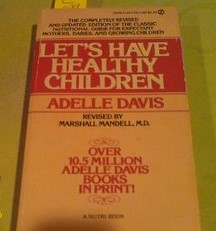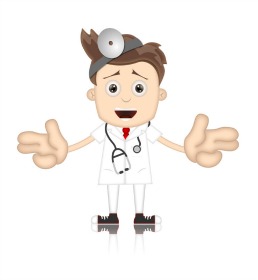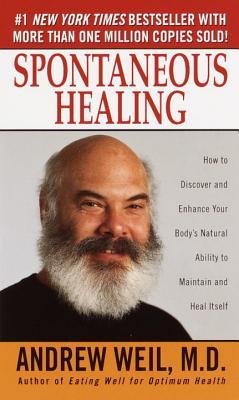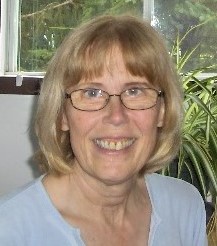Sick or Better
Is it Your Choice?
Sick or better - is this a choice? Or is it just 'how life goes"? Can you affect your future for better or worse?
I believe you can.
I have good excuses for being sick. Have you ever heard the expression "Your health partly depends on what your grandmother ate for breakfast"? No, I don't mean what your grandmother ate this morning for breakfast. If you look at her growing up years, before she had your mother, was she healthy? Did she have good food to eat? What was life like for her?
German Mennonite Background
I come from a German Mennonite background. Back in the day, Mennonites were pacifist (they still are), and did not want to fight in the German army. Catherine the Great invited them to settle the Ukraine and told them they wouldn't had to fight. (This was the late 1700s). The Mennonites moved there and prospered. Then the Russian Revolution happened in 1917. The Mennonites lost their land and belongings and many escaped to other parts of the world.
My mom's family fared a bit better than my dad's family, but things were hard for all of them. Both of my parents' teeth basically rotted away by the time they were in their thirties, as their childhood nutrition did not include - well - milk for one thing. My dad was not given milk for the first two years of his life; there just wasn't any. He was kept alive on some sort of thin gruel or mash.
All this to say that genetically, I didn't start ahead of the game. I feel like I always have to work harder than others just to maintain my health at the same level as them; I can't get away with as much, nutritionally speaking.
Happy Childhood in Niagara - But...

I grew up on a grape farm in the Niagara Peninsula of Canada. I had a happy childhood and never felt like I had to do without. But looking back, I can see that my parents didn't have a lot of money. Things like - this is normal, isn't it? One Christmas gift at Christmas. The gifts were placed under the tree Christmas Eve after we kids had gone to bed because there was no wrapping paper. Couldn't afford that. Things like we only flushed the toilet when it was - really necessary- if you know what I mean. We had to buy water and have the cistern filled up - couldn't waste the water. But as a child, all this seemed normal.
My dad had always had an interest in photography, and had a darkroom to process pictures himself in the dirt floor cellar beside the old wringer washer. When I was ten, he decided to turn his hobby into a business with a photo studio and a more professional processing area. He won a contract to take pictures of newborn babies in the local hospitals for an American company and sell to the new moms, earning a commission.
This was the beginning of a very busy, lucrative home business for which any of us kids could work while growing up. For me, this meant that from about twelve years old and on, I was immersed for many hours a week in chemical vapours. Yes, there was ventilation, air conditioning and fans, but the smells were very strong. It didn't occur to anyone that this might be a problem.
My dad and I both had some reaction to the chemicals. My mom didn't, and others who worked for us didn't. I would get very painful blisters below my nail beds, and so I wore the same kind of gloves that doctors wear. I remember once when my dad had to reach in a chemical bath to retrieve something that had fallen to the bottom, and his whole arm was swollen with huge sores after that. His doctor prescribed various creams but it was very difficult to get this healed.
My First Exposure to Healthy Ideas
In my early twenties, I was married and having my first baby. A friend lent me a book called "Let's Have Healthy Children".

That was a God-send. The author was a nutritionist who worked with a pediatrician in the States at a time when the idea that what your kids eat affects how many colds they might get was still a new and strange idea. She was a bit strident and forceful in her presentation, but the bottom line was, "Any problems you have in pregnancy are abnormalities and if your nutrition was adequate you wouldn't have them."
That was not the normal thinking, everyone "knows" that you have morning sickness, muscle cramps, ankle swelling, stretch marks etc. when you're pregnant. But I was intrigued; if you don't have to have those problems, why have them? So I took the extra B vitamins and didn't have morning sickness. I took the extra calcium and didn't have muscle cramps. I took the Vitamin E, making sure to take it with a meal that included fat, because it's a fat soluble vitamin, and I didn't have stretch marks. I made sure to keep my protein intake really high when the baby's muscle is being formed, because that kept me from holding water and having swollen ankles.
99 people out of 100 say
"You can't avoid the problems."
1 person out of 100 says,
"Yes, you can!"
I decided to follow the 1 out of 100.
What happened?
I avoided the problems.
Why have the problems
if you don't have to?
Fast forward to my thirties. I am married with kids, my husband and I have a business and life is busy and a bit stressful. I looked after "the books", and I remember noticing that my left hand was starting to hurt when I used the adding machine. I shrugged it off. One of my kids was getting into a bit of trouble, and at this point I was really stressed. I started getting sick a lot. Any cold or flu that went around - I got it and I was sicker than everyone else, and sick longer than everyone else.
Then one evening my husband and I were out for dinner and I was resting my chin on my hand and my husband says, "What's wrong with your arm?" I looked and there were some brown scaly looking patches on my skin. "I don't know", I said. It didn't hurt or anything.
After that I noticed some similar patches above one ankle. So I went to the doctor.

"It's morphia", he said.
"What's morphia?" I asked.
"It's a type of scleroderma", he answered.
"What's scleroderma?" I asked.
"It's an inappropriate reaction of your immune system."
"Oh, you mean like hay fever." (I was annually plagued with hay fever every late August until first frost.)
"No, that's an over-reaction of your immune system. This is an inappropriate reaction of your immune system."
I'm still looking at him blankly so he continued, "Like arthritis or lupis, for instance. But it comes and goes, maybe stress makes it worse. We don't really know why this happens but I can give you a prescription to handle the symptoms."
I didn't fill the prescription, but I did some research on scleroderma and discovered that this involves the hardening of skin surfaces. This isn't too serious when it's on the surface of the arm, but this can affect any surface including the surfaces of the lungs, stomach, heart, anything. This would mean my lungs wouldn't be able to expand with air, or my heart wouldn't be able to beat if this condition became severe enough.
A few weeks before this, I had seen a book in the book store that interested me called "Spontaneous Healing", written by Dr. Andrew Weil. After the doctor's visit, I immediately bought it.

This was my second
exposure to this different view of health - where my nutrition
mattered. My thinking mattered, my feelings. An exposure to "healing
stories"; not some kind of miraculous stories from the Bible, but
stories of healing because that's how it works when you do the right
things. Also - "let the whole world be a liar and one man be true" - the
truth doesn't always lie in "what everybody knows" and "what everyone
thinks"; it sometimes lies in the single voice.
During the next few months, I continued having more joint pain and fatigue. I would walk up in the morning and my hands would be still for at least twenty minutes. I did some research and although I didn't bother to go to the doctor for an official diagnosis, my symptoms fit nicely into a list of symptoms describing rheumatoid arthritis.
And I thought, "Hmmm, I can die from scleroderma, and I can end up crippled, bedridden, and in huge pain from rheumatoid arthritis. Why go there if I don't have to?"
And it's been all uphill from there!
It's been quite the journey! Sometimes it's involved working through emotional issues in order to end a physical condition. Sometimes it's been deciding to stop eating this, or start eating that. It all involves being willing to make the changes you need to make to achieve your optimum health.
I haven't mentioned my kids yet...
I have four of them. Two are ADD. I have learned much about ADD and I have learned much about ADD coping strategies. I have learned that surprise! I'm ADD. I didn't realize it until I was reading a book that I own called "ADD Success Stories" by Thom Hartmann. Coping strategies must take up a third of the book, and as I was reading them, I thought, "Oh, that would be a good idea for me. That's funny, since I'm not ADD." Then, "Oh, that's a good idea for me too, that's funny, since I'm not ADD". Or, "Hey, I already do that! How about that!" After a bit, it was "Hmm, this is really fitting me..."
And I've discovered how to eat if I want to keep my focus sharp (like when I'm working at a bank and I really don't want to make a mistake with your money). I discovered that my daughter needed to keep eating regularly or she would turn into "Eeyore" - (the sad donkey from Winnie the Pooh - it's like nothing is good, everything is bad, and nothing will ever be good again). My son didn't finish school at the time but has now gotten his GED. When it came to exam time, "Make sure you eat some protein! Don't drink any pop! Don't have sandwiches, that's too many carbs, you won't be able to focus". (He passed with flying colours).
The other two both got sick. My oldest daughter got chronic fatigue syndrome at a time when most doctors were still saying, "It's all in your head!". She had to quit school during her grade 12 year. We were at the doctor, then the specialists. With the digestive upset, she even got as far as a Barium X-Ray. The specialist said, "There's nothing wrong. It's probably just stress", (that's doctor speak for "it's all in your head.)
Then the flu was going around again. My youngest, who was then nine, got sick. She was sicker than everyone else, and stayed sicker longer than everyone else, and then just really didn't get better. She stayed so tired. She could hardly function and missed a lot of school. I thought, "Are you kidding me right now? This sounds just like my older daughter."
Off to the doctor again. This time he sent us to a specialist who had herself gotten chronic fatigue and had made it a bit of a side specialty in her practice. But nothing was really helping. I sighed and said, "Ok, we're going to have to spring for the big money options", (in Canada, we have free health care, but the alternatives like naturopaths, nutritionists etc. aren't covered.) The bottom line - a nutritionist, a good naturopath and the recommended herbs and supplements, stress management and the right diet did the trick.
Sick or Better?
You do have to be willing to change. As author and trainer Jack Canfield has said, "The choices that you've made and your response to things that have happened have gotten you where you are today." The good news is that this puts the "ball in your court", so to speak. You get to make choices, you get to bring different results in your life.
It's up to you. And that's good news.
 |
Teresa has left the city life and lives in Prince Edward Island, Canada with her husband |
|
Return to Top of Page |

New! Comments
Have your say about what you just read! Leave me a comment in the box below.